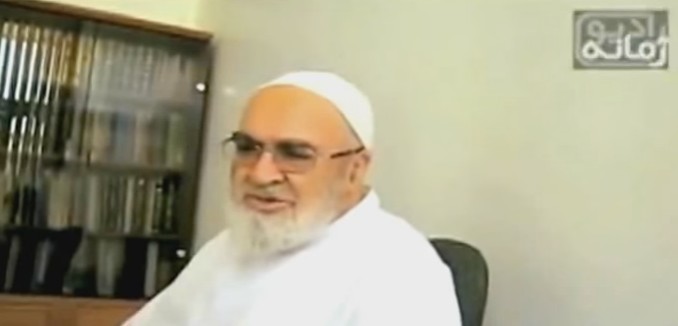A prominent Iranian ayatollah condemned the state-sponsored executions of thousands of political prisoners in the summer of 1988 as “the biggest crime in the Islamic Republic,” according to an audio recording recently released by his family, The Guardian reported on Thursday.
The publication of the recording has prompted survivors and relatives of those killed to call on the Tehran regime to investigate the purge.
On the tape, the late Ayatollah Hossein Ali Montazeri is heard criticizing the executions of leftists and sympathizers of the Mujahedin-e Khalq (MEK) organization, telling an audience of religious judges and prosecutors, “In my view, the biggest crime in the Islamic Republic, for which the history will condemn us, has been committed at your hands, and they’ll write your names as criminals in the history.”
Previously thought of as a successor to Ayatollah Ruhollah Khomeini, the founder of the Islamic Republic, Montazeri was the only senior Iranian official to speak out against the killings at the time. He wrote numerous letter to Khomeini condemning the executions, and was eventually placed under house arrest until his death in 2009.
The executions were precipitated by an MEK attack on Iran from Iraq during the war between the two nations. Montazeri, who believed that his own son was murdered by the MEK — which was designated a terrorist group by the U.S. and Europe for many years — nonetheless suggested that the executions of the prisoners had been planned for a long time and that the attack simply provided the authorities with the pretext to carry them out.
“I haven’t been able to sleep and every night it occupies my mind for two to three hours,” Montazeri is heard saying in the recording. “What do you have to tell to the families?”
The ayatollah suggested that the number of people executed by the revolutionary government exceeded the number killed by the Shah of Iran, who was overthrown in 1979. When he was asked for his consent for the execution of 200 people, he retorted, “I don’t give permission at all. I am opposed even to a single person being executed.”
While executions of dissidents were common during the early years of the Islamic Republic, the summer of 1988 saw them carried out on a much larger scale. Khomeini issued a fatwa calling for the execution of all prisoners who were considered apostates and refused to repent. Prisoners were brought before panels and asked a series of questions about their religious and political beliefs. Any prisoner who answered the brief series of questions incorrectly was executed. Many were buried in a mass unmarked grave near Tehran.
Amnesty International estimates that 4,500 people were killed by the state during the purge, while other groups have cited higher estimates.
Madyar Samienejad, an Norway-based activist for human rights in Iran, said that the recording of Montazeri serves as “historical evidence” for the executions. “Those who were involved in the 1988 massacre of political prisoners are still in power in Iran,” he added. “The high rate of executions in Iran today stems from the kind of mentality behind that massacre.”
One of those involved in the mass executions in 1988 was Mostafa Pour-Mohammadi, who three years ago was appointed Iran’s justice minister by President Hassan Rouhani. At the time, many activists questioned how the appointment was consistent with Rouhani’s reputation as a moderate. Executions in Iran have increased in each of the first three years of Rouhani’s tenure, reaching a total of 966 last year, the highest total in a decade.
Another human rights campaigner, Hadi Ghaemi of the New York-based International Campaign for Human Rights in Iran, called the recording “irrefutable proof” of “the arbitrary and horrifying nature of these executions that rise to crimes against humanity under international law.”
[Photo: YekEsfahaniDarParis 4 / YouTube ]




